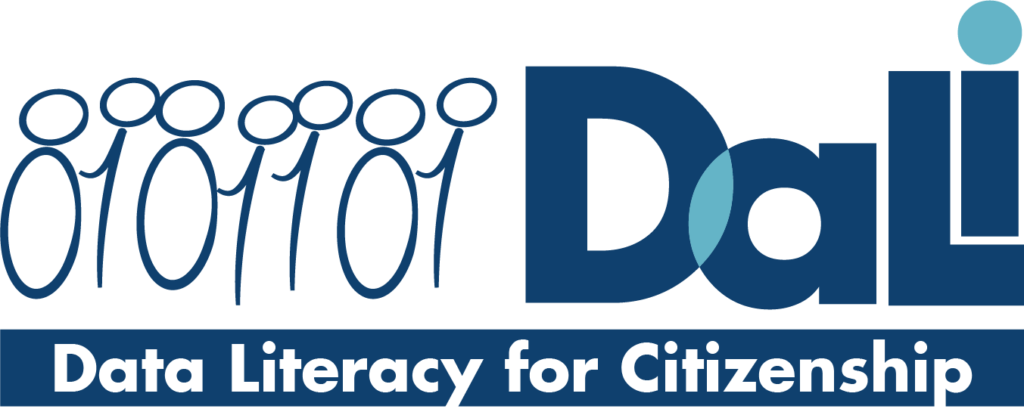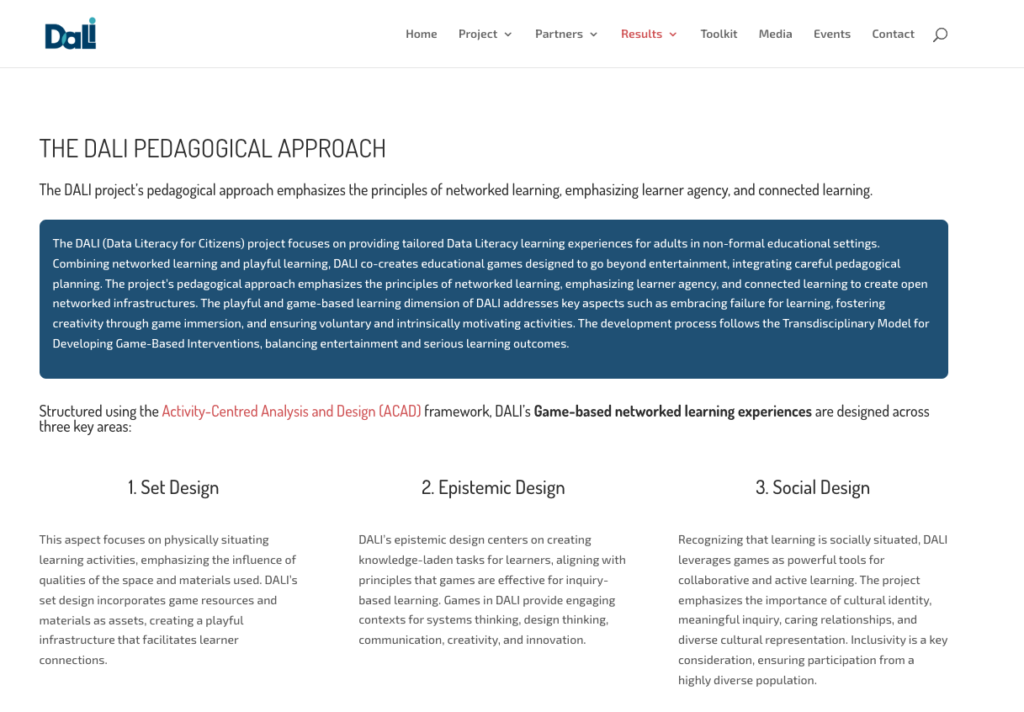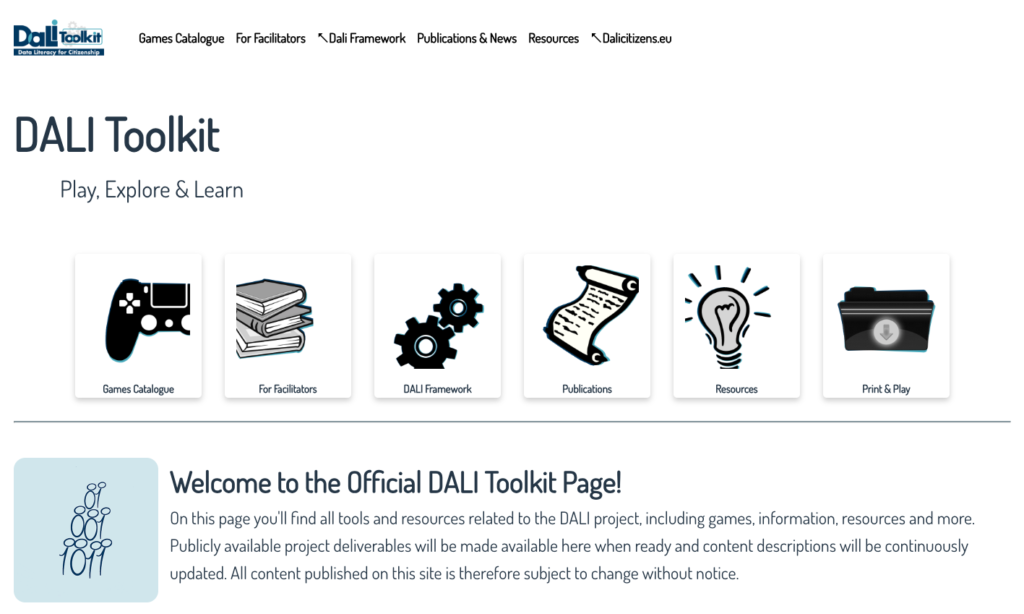 On 30 December 2023, the DALI project -Data Literacy for Citizenship- (https://dalicitizens.eu/ ) officially ended a project that we have been working on at UM for the last three years and in which our challenge was to develop practical educational materials and resources for the development of Data Literacy in adults of all age ranges, i.e. to promote how people use and engage with the data they encounter in their daily lives as citizens.
On 30 December 2023, the DALI project -Data Literacy for Citizenship- (https://dalicitizens.eu/ ) officially ended a project that we have been working on at UM for the last three years and in which our challenge was to develop practical educational materials and resources for the development of Data Literacy in adults of all age ranges, i.e. to promote how people use and engage with the data they encounter in their daily lives as citizens.
In these three years, we have developed in the four official languages of the project (and therefore also in Spanish)
- A competency framework for Data Literacy https://dalicitizens.eu/index.php/dali-data-literacy-framework-2/
- A pedagogical approach based on games https://dalicitizens.eu/index.php/dali_pedagogical_approach/
- A set of more than 12 board games (for adults, from young to old) for the development of the most basic level of competence, which are openly available in Print&play format (i.e. the games can be downloaded immediately in the four languages of the project and printed out to play) https://toolkit.dalicitizens.eu/catalogue
- A didactic guide in which the importance and the pedagogical background of each of the games is explained (what we call the Handbook and the facilitators’ guide) https://toolkit.dalicitizens.eu/for-facilitators
- A catalogue of other activities for data literacy training generated from other spaces and institutions in the world: https://dalicitizens.eu/index.php/data-literacy-resources/
- Some policy recommendations https://dalicitizens.eu/index.php/policy-2/
And much more…
And EVERYTHING is now available for free and open use on our website.
I have been the project’s contact person for the UM team and had the immense good fortune to work on it. I have had the opportunity to learn, meet, laugh, work hard and generate, with my project partners, a lot of material that I firmly believe is useful to face one of the most critical challenges posed by the current and imminent future technological reality, how people should relate healthily with the data that is generated around them?
Since the first time, we were asked for a workshop “for the healthy use of social networks” back in the first decade of the 21st century, I have always been convinced that the only way to become more human in a world with technology is to emancipate ourselves to be better humans, to make better decisions, to be able to make human decisions –being empowered– in this world and WITH technology. … and I believe that DALI does all of this. Furthermore, I think that it does it with deep pedagogical roots that give more substance to this emancipatory and empowering perspective… it is an educational project… of educational technology.
It has been a precious experience; I feel very proud of the work we have done from Murcia (thanks to Inma Haba-Ortuño especially). It is also a project in which many people have been able to work, collaborate and feel involved… Even my students have been able to work with the games! So, all the better…
As I said above, all the materials are open and licensed to be modified for further use.
I hope you can browse and use any of the materials we have produced and that you find them useful.
SOME ACADEMIC PAPERS FROM DALI PROJECT
- Castañeda, Linda, Inmaculada Haba-Ortuño, Daniel Villar-Onrubia, Victoria I. Marín, Gemma Tur, José A. Ruipérez-Valiente, and Barbara Wasson. 2024. ‘Developing the DALI Data Literacy Framework for Critical Citizenry’. RIED-Revista Iberoamericana de Educación a Distancia 27 (1). doi:10.5944/ried.27.1.37773. (Online First) https://doi.org/10.5944/ried.27.1.37773
- Castañeda, L., Villar-Onrubia, D., Haba-Ortuño, I., Postigo-Fuentes, A. Y., & Arnab, S. (2022). Game-based Networked Learning. Proceedings For The Thirteenth International Conference On Networked Learning, 273–277 https://dalicitizens.eu/wp-content/uploads/2023/12/Game-based-Networked-Learning.pdf
- Castañeda, L.; Arnab, S.; Tur, G.; Klykken, F.; Wasson, B.; Haba-Ortuño, I.; Maloszek, R.; De Benito-Crossetti, B. (in press) Co-creating pedagogically informed games for data literacy. Revista de Educación. (IN PRESS)
The DALI project is an Erasmus+ Strategic Action for Adult Education project (KA204-076492) coordinated by the University of Bergen and involving four other European universities: Coventry University (UK), Friedrich-Alexander-Universität Erlangen-Nürnberg (Germany), Universitat de les Illes Balears (Spain) and Universidad de Murcia (Spain).



 than 75 tools and I hope that, having incorporated it into the way they work with technology, it will be useful as a revival of their approach to technology
than 75 tools and I hope that, having incorporated it into the way they work with technology, it will be useful as a revival of their approach to technology